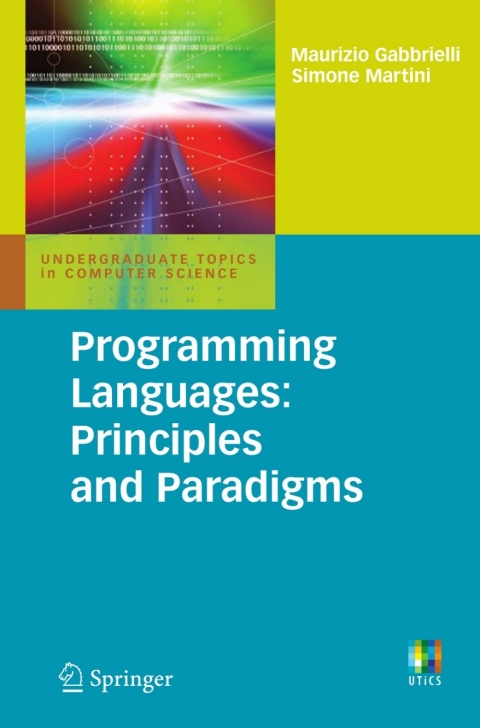Description
Efnisyfirlit
- Foreword
- Introduction
- Use of the text
- Acknowledgements
- Contents
- Abstract Machines
- The Concepts of Abstract Machine and of Interpreter
- The Interpreter
- An Example of an Abstract Machine: The Hardware Machine
- Memory
- The language of the physical machine
- Interpreter
- Implementation of a Language
- Implementation of an Abstract Machine
- Implementation in Hardware
- Simulation Using Software
- Emulation Using Firmware
- Implementation: The Ideal Case
- Notation
- Purely interpreted implementation
- Purely compiled implementation
- Comparing the Two Techniques
- Implementation: The Real Case and The Intermediate Machine
- Hierarchies of Abstract Machines
- Chapter Summary
- Bibliographic Notes
- Exercises
- References
- How to Describe a Programming Language
- Levels of Description
- Grammar and Syntax
- Context-Free Grammars
- BNF
- Derivations and languages
- Derivation Trees
- Ambiguity
- Contextual Syntactic Constraints
- Compilers
- Lexical analysis
- Syntactic analysis
- Semantic analysis
- Generation of intermediate forms
- Code optimisation
- Code generation
- Semantics
- State
- Transitions
- Expression semantics
- Command semantics
- Computations
- Pragmatics
- Implementation
- Chapter Summary
- Bibliographical Notes
- Exercises
- References
- Foundations
- The Halting Problem
- Expressiveness of Programming Languages
- Formalisms for Computability
- There are More Functions than Algorithms
- Chapter Summary
- Bibliographical Notes
- Exercises
- References
- Names and The Environment
- Names and Denotable Objects
- Denotable Objects
- Environments and Blocks
- Blocks
- Types of Environment
- Operations on Environments
- Scope Rules
- Static Scope
- Dynamic Scope
- Some Scope Problems
- Chapter Summary
- Bibliographical Notes
- Exercises
- References
- Memory Management
- Techniques for Memory Management
- Static Memory Management
- Dynamic Memory Management Using Stacks
- Activation Records for In-line Blocks
- Activation Records for Procedures
- Stack Management
- Dynamic Management Using a Heap
- Fixed-Length Blocks
- Variable-Length Blocks
- Single free list
- Multiple free lists
- Implementation of Scope Rules
- Static Scope: The Static Chain
- Static Scope: The Display
- Dynamic Scope: Association Lists and CRT
- Central Referencing environment Table (CRT)
- Chapter Summary
- Bibliographic Notes
- Exercises
- References
- Control Structure
- Expressions
- Expression Syntax
- Infix Notation
- Prefix Notation
- Postfix Notation
- Semantics of Expressions
- Infix Notation: Precedence and Associativity
- Prefix Notation
- Postfix Notation
- Evaluation of Expressions
- Subexpression Evaluation Order
- The Concept of Command
- The Variable
- Assignment
- Sequence Control Commands
- Commands for Explicit Sequence Control
- Sequential Command
- Composite Command
- Goto
- Other sequence control commands
- Conditional Commands
- If
- Case
- Iterative Commands
- Unbounded iteration
- Bounded iteration
- Expressiveness of bounded iteration
- The for in C
- For-each
- Structured Programming
- Recursion
- Tail Recursion
- Recursion or Iteration?
- Chapter Summary
- Bibliographical Notes
- Exercises
- References
- Control Abstraction
- Subprograms
- Parameters
- Return value
- Nonlocal environment
- Functional Abstraction
- Parameter Passing
- Call by value
- Call by reference
- Call by constant
- Call by result
- Call by value-result
- Call by name
- Higher-Order Functions
- Functions as Parameters
- Implementation of deep binding
- Binding policy and static scope
- What defines the environment
- Functions as Results
- Exceptions
- Pragmatics
- Implementing Exceptions
- Chapter Summary
- Bibliographical Notes
- Exercises
- References
- Structuring Data
- Data Types
- Types as Support for Conceptual Organisation
- Types for Correctness
- Types and Implementation
- Type Systems
- Static and Dynamic Checking
- Scalar Types
- Booleans
- Characters
- Integers
- Reals
- Fixed Point
- Complex
- Void
- Enumerations
- Intervals
- Ordered Types
- Composite Types
- Records
- Variant Records and Unions
- Unions in C
- Variants and Security
- Arrays
- Operations on Arrays
- Checking
- Storage and Calculation of Indices
- Form of an Array: Where an Array is Allocated
- Dope Vectors
- Sets
- Pointers
- Pointer Arithmetic
- Deallocation
- Recursive Types
- Functions
- Equivalence
- Equivalence by Name
- Structural Equivalence
- Compatibility and Conversion
- Coercions
- Explicit Conversions
- Polymorphism
- Overloading
- Universal Parametric Polymorphism
- Explicit polymorphism
- Implicit Polymorphism
- Subtype Universal Polymorphism
- Remarks on the Implementation
- Type Checking and Inference
- Safety: An Evaluation
- Avoiding Dangling References
- Tombstone
- Locks and Keys
- Garbage Collection
- Reference Counting
- Mark and Sweep
- Interlude: Pointer Reversal
- Mark and Compact
- Copy
- Chapter Summary
- Bibliographic Notes
- Exercises
- References
- Data Abstraction
- Abstract Data Types
- Information Hiding
- Representation Independence
- Modules
- Chapter Summary
- Bibliographical Notes
- Exercises
- References
- The Object-Oriented Paradigm
- The Limits of Abstract Data Types
- A First Review
- Fundamental Concepts
- Objects
- Classes
- Objects in the heap and on the stack
- Encapsulation
- Subtypes
- Redefinition of a method
- Shadowing
- Abstract classes
- The subtype relation
- Constructors
- Inheritance
- Inheritance and visibility
- Single and multiple inheritance
- Dynamic Method Lookup
- Implementation Aspects
- Objects
- Classes and inheritance
- Late binding of self
- Single Inheritance
- Downcasting
- The Problem of Fragile Base Class
- Dynamic Method Dispatch in the JVM
- Multiple Inheritance
- Vtable Structure
- Replicated multiple inheritance
- Shared multiple inheritance
- Polymorphism and Generics
- Subtype Polymorphism
- Generics in Java
- Implementation of Generics in Java
- Generics, Arrays and Subtype Hierarchy
- Covariant and Contravariant Overriding
- Supertypes and Views
- Chapter Summary
- Bibliographical Notes
- Exercises
- References
- The Functional Paradigm
- Computations without State
- Expressions and Functions
- Computation as Reduction
- The Fundamental Ingredients
- Evaluation
- Values
- Capture-Free Substitution
- Evaluation Strategies
- Evaluation by value
- Evaluation by name
- Lazy evaluation
- Comparison of the Strategies
- Programming in a Functional Language
- Local Environment
- Interactiveness
- Types
- Pattern Matching
- Infinite Objects
- Imperative Aspects
- Implementation: The SECD Machine
- The Functional Paradigm: An Assessment
- Program Correctness
- Program schemata
- Assessment
- Fundamentals: The lambda-calculus
- Syntactic conventions, free and bound variables
- Substitution
- Alpha equivalence
- Computation: beta reduction
- Normal forms
- Confluence
- Fixpoint operators
- Expressiveness of the lambda-calculus
- Chapter Summary
- Bibliographical Note
- Exercises
- References
- The Logic Programming Paradigm
- Deduction as Computation
- Terminological Note
- An Example
- Syntax
- The Language of First-Order Logic
- Alphabet
- Terms
- Formulæ
- Logic Programs
- Theory of Unification
- The Logic Variable
- Substitution
- Most General Unifier
- A Unification Algorithm
- Martelli and Montanari’s unification algorithm
- The Computational Model
- The Herbrand Universe
- Declarative and Procedural Interpretation
- Procedure Calls
- Evaluation of a non-atomic goal
- Heads with arbitrary terms
- Control: Non-determinism
- Backtracking in Prolog
- Some Examples
- Extensions
- Prolog
- Arithmetic
- Cut
- Disjunction
- If-then-else
- Negation
- Logic Programming and Databases
- Logic Programming with Constraints
- Advantages and Disadvantages of the Logic Paradigm
- Chapter Summary
- Bibliographical Notes
- Exercises
- References
- A Short Historical Perspective
- Beginnings
- Factors in the Development of Languages
- 1950s and 60s
- FORTRAN
- Algol
- LISP
- COBOL
- Simula
- The 1970s
- C
- Pascal
- Smalltalk
- Declarative languages
- ML
- PROLOG
- The 1980s
- C++
- Ada
- CLP
- 1990s
- Java
- Chapter Summary
- Bibliographical Notes
- References
- Index






Reviews
There are no reviews yet.